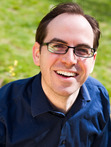Adam Szymkowicz's Blog, page 34
May 2, 2017
I Interview Playwrights Part 933: Jelisa Jay Robinson
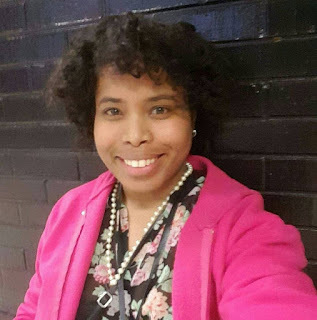
Jelisa Jay Robinson
Hometown: Houston, Texas
Current Town: Houston and Austin, Texas is like a second home.
Q: What are you working on now?
A: 4 projects.
I am scripting a play about three high school students named Mani, Murdr and Javier and their journey to finding their voices through poetry in present-day America. I work with high school students so this piece reflects their voices, language and nuances. Students have many things to say about the world and my play seeks to disrupt the notion that high school students should just accept what is given to them. They can create change. This play will be followed by a sequel or a continuation story that follows the students to college.
Next, I will get to work on a piece about Black American migration to Mexico. I've been itching to tell this story.
I working on a short performance piece that deals with being Black American and growing up around Mexican Americans.
Q: Tell me about the Stories of Us.
A: The Stories of Us is a collection of stories that dig deep into intercultural conflict between African Americans and Latinos, African Diaspora identity and Afrolatinidad. Think of it as a scrapbook of experiences, histories and feelings on the stage. It’s takes you through stories about African roots in Mexico, the time you told your brother you were dating a “Black girl” and that moment you were proud of your heritage. The Stories of US details our stories as people of color trying to navigate each other’s worlds and build one together.
Q: Tell me, if you will, a story from your childhood that explains who you are as a writer or as a person.
A: I have been creative since I was four year old. I would always create stories based off of the Lion King and Bambi characters. I memorized the entire Lion King film and don't get me started on my imagination. It would run wild. I used to write stories, poems, songs, etc. Creating was life and it all came from deep inside. That is what lead me to be a writer. I was always in my own world, and writing allows me to dream up new worlds.
Q: If you could change one thing about theater, what would it be?
A: More opportunities for people to make a living off their art.
Q: Who are or were your theatrical heroes?
A: My Mom. Professor Stephen Gerald (RIP), Nsangou Njikam, Lin Manuel Miranda, Dr. Omi Osun Joni L. Jones, Isaac Gomez, Jacqueline Lawton, Roxanne Schroeder-Arce, Holli Gipson, Amiri Baraka, Katori Hall, Shonda Rhimes, Tyler Perry, Los Rakas, Issa Rae, Ease Way Says, Ja’Michael DarnelI, ’Brian Oselgby, and Krysta Gonzales.
To be honest, many of my theatrical heroes are musicians right now like Big Sean, Juanes and J.Cole. They weave stories into their music and captivate their audience.
Q: What kind of theater excites you?
A: Theatre that makes me put myself in the character's shoes. I feel for the character. I take them with me. That's the kind that excites me. I love theatre that tells the stories that I have not heard.
Q: What advice do you have for playwrights just starting out?
A: Be confident in your stories, because if you don't believe in them who else will. I have learned that if you have the passion, drive and love for the work...for the story...the right people will come. Build your community and be generous with support. Shout out your writer/actor/creative friend's work on social media, send them a text or a 90s style phone call and tell them how dope they are. Send love always. Sometimes that love looks like feedback.
Q: Plugs, please:
A:
Personal Website
HowlRound Articles
50 Playwrights Project interview
New Play Exchange
---------------------------------------------------------------------------------------------------------
Enter Your Email To Have New Blog Posts Sent To You
-----------------------------------------------------------------------------------------------------------
Support The Blog

-----------------------------------------------------------------------------------------------------------
Mailing list to be invited to Adam's events
Email:
------------------------------------------------------------------------------------------------------------
Adam's Patreon
Adam's New Play Exchange Profile (Plays to Read)
Books by Adam (Amazon)







Published on May 02, 2017 08:00
May 1, 2017
I Interview Playwrights Part 932: Edward Einhorn
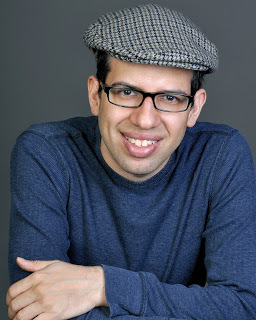
Edward Einhorn
Hometown: Westfield, NJ
Current Town: New York City
Q; Tell me about The Marriage of Alice B. Toklas by Gertrude Stein.
A: It's a marriage farce set at the fantasy wedding of Stein and Toklas. Four actors play about 30 roles, particularly featuring Hemingway and Picasso as well as Stein and Toklas. I wanted to create a tragic farce in the mode of Ionesco, structured a little like Waiting for Godot (two parallel acts that speak to each other), using some of the language of Stein. There's also definitely some Ridiculous Theatre influence (and we have a few Ridiculous Theatre veterans involved in the production). It tells the story of their lives together, which like all lives is a mixture of comedy and tragedy. Of course, there is a political edge, as it implicitly examines some of the politics of gay marriage. But essentially it is about two individuals and their unique relationship.
Q: What else are you working on now?
A: I am writing a play called The Resistable Rise of J R Brinkley, a political play in the mode of Brecht, dealing with our current president by telling the story of another notorious con man. Brinkley was a quack who became rich by selling a supposed cure for impotence--surgery that inserted goat testicles into human. He became a radio personality and eventually ran for governor of Kansas...and won, though they illegally invalidated the result. I am fascinated about how such a seemingly obvious fraud was able to fool so many people...and what it is about the American psyche that we celebrate wealthy men as if they are also great leaders.
Q: Tell me, if you will, a story from your childhood that explains who you are as a writer or as a person.
A: My older brother read me Ionesco as a kid (starting at seven years old). By nine, my favorite plays were Rhinoceros and The Bald Soprano.
Q: If you could change one thing about theater, what would it be?
A: Obviously, the world of criticism is a mess. I wish there were more of an attempt in New York to pay attention to small downtown work. Even the OBIEs have become a celebration of the wealthy, mostly going to shows with huge budgets. Now that newspapers are dying, we have an even greater responsibility to support each other.
Q: Who are or were your theatrical heroes?
A: As you might guess from the above, Ionesco and Beckett and Stein are all heroes. Vaclav Havel as well, and in this case I had the amazing opportunity to work with him for a number of years.
Q: What kind of theater excites you?
A: Theater that tackles great ideas with strong theatricality. I am all about finding innovative ways to theatricalize complicated political, scientific, and philosophical arguments.
Q: What advice do you have for playwrights just starting out?
A: Turn back now. The landscape is getting harder and harder. But if you must do it, find some way to find the ideas or situations that most excite you and convey your excitement about it in your work. Anything can be interesting, if an audience understands why you find it interesting. Communicate that excitement.
Q: Plugs, please:
A: I will make this, why should you see The Marriage of Alice B. Toklas by Gertrude Stein. Here are some reasons: We have Mia Katigbak as Stein, who won both an Obie and a Lortel. Jan Leslie Harding, who plays Picasso, won two Obies. Grant Neale (Hemingway) is a Ridiculous Theater veteran, and Alyssa Simon (Toklas) has one nytheater.com's Person of the Year. And they are all amazing, as is our design crew. Also: It's fun, funny, only 80 minutes long, and comes with free champagne. And it plays at HERE May 10 - 28. You can get tickets/read more at www.untitledtheater.com
---------------------------------------------------------------------------------------------------------
Enter Your Email To Have New Blog Posts Sent To You
-----------------------------------------------------------------------------------------------------------
Support The Blog

-----------------------------------------------------------------------------------------------------------
Mailing list to be invited to Adam's events
Email:
------------------------------------------------------------------------------------------------------------
Adam's Patreon
Adam's New Play Exchange Profile (Plays to Read)
Books by Adam (Amazon)







Published on May 01, 2017 08:00
April 30, 2017
I Interview Playwrights Part 931: Joshua Inocencio
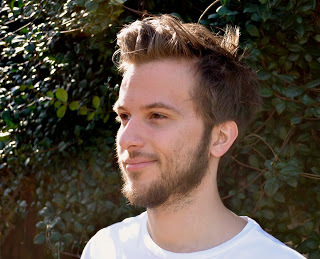
Joshua Inocencio
Hometown: Houston, TX
Current Town: Houston, TX*
*But lived in Corpus Christi, TX, Tallahassee, FL, and passed many summers and winters in eastern Kentucky.
Q: What are you working on now?
A: Currently, I’m entrenched in a trilogy project, entitled Splintered in Three, that explores collisions between ethnicity and sexuality in my three cultural backgrounds. My father’s parents immigrated to the U.S. from Mexico and Austria, and my mother’s family has lived in Appalachia for generations. Right now, I’m in the editing and soon-to-be production phase of the second play, The Little Edelweiss; or, An Immigrant’s Fairytale, which charts my bisexual Great-Uncle Manfred’s journey from war-torn Linz to the United States, amid celebrity affairs and draft dodging and substance abuse, as he chased a white immigrant’s American Dream. In the play, I portray myself as well as my great-uncle in imagined scenarios (we never met in person by the time he died) and pursuits of pleasure. Other characters are portrayed through puppets and voiceovers. The play finished as a semifinalist for the Eugene O’Neill National Playwrights Conference this year, so my collaborators and I are now in the process of getting the production on its feet. We’re slated for a spring 2018 premiere in Houston.
The first play in the trilogy, Purple Eyes, looks at my Mexican identity and I’m currently touring the piece around Texas to theatres and universities (it’s the only one in the trilogy that’s a solo play). Purple Eyes is going to receive its world premiere at Stages Repertory Theatre next season. The third, Chocolate Gravy & White Jesus, explores my maternal Kentuckian roots. I’m just about finished with the first full draft of that one.
Outside of the trilogy, I just wrapped up work on a new ten-minute play, Ofélio, which is about a sexual assault between a graduate student and an undergrad. And I’m writing what is, as of now, a one-act play about two buddies, a straight guy and gay guy in their 20s, who take a road-trip across the Midwest. The working title is Bromos but we’ll see.
Q: Tell me, if you will, a story from your childhood that explains who you are as a writer or as a person.
A: I think I always had a penchant for storytelling as a kid. I asked a ton of questions (still do) and, tied to that, I was always curious about cultural origins. My Austrian grandma not only read me children’s fairytales from her homeland, but she would often tell me personal yet fantastical stories about growing up in Austria before the war. And my other grandmother, on my mother’s side, stitched me costumes based on movie characters. So between riffing on myths and dressing up (whether it was as Aladdin from the Disney film or Dorothy from The Wizard of Oz), I was constantly creating and telling stories.
Q: If you could change one thing about theater, what would it be?
A: Hmm. I want to see more localized theatre that cultivates sustainable living opportunities for homegrown playwrights and other theatre artists. Right now, I’m serving as an associate producer for a Latina/o theatre festival that’s happening at Stages Repertory Theatre in February 2018. Our chief goal is to showcase and develop work that is of Texas. I want to see more things like this happening across the country. There’s no reason why Houston and other cities can’t be theatre hubs like NYC or Chicago.
Q: Who are or were your theatrical heroes?
A: I started writing plays because of John Leguizamo and Virginia Grise. They made me see the value in personal narrative and writing about “home”—whatever that means to us. As I’ve continued writing, some of the playwrights I’ve looked up to most are Mark Ravenhill, Caryl Churchill, Cherríe Moraga, Tarell McCraney, Erik Ehn. All riveting voices in both American and British theatre.
Q: What kind of theater excites you?
A: I enjoy theatre that makes me uncomfortable, that disturbs, that disrupts the way I think about the world. I like theatre that gives a voice to forgotten or erased histories.
Q: What advice do you have for playwrights just starting out?
A: Thrive in the nuances. Keep everything you write. And produce your own work if no one else will.
Q: Plugs, please:
A: Purple Eyes website
Personal website
50 Playwrights Project interview
OutSmart Magazine articles
Houston Chronicle on Stages Rep’s “Sin Muros” festival
---------------------------------------------------------------------------------------------------------
Enter Your Email To Have New Blog Posts Sent To You
-----------------------------------------------------------------------------------------------------------
Support The Blog

-----------------------------------------------------------------------------------------------------------
Mailing list to be invited to Adam's events
Email:
------------------------------------------------------------------------------------------------------------
Adam's Patreon
Adam's New Play Exchange Profile (Plays to Read)
Books by Adam (Amazon)







Published on April 30, 2017 08:00
April 29, 2017
I Interview Playwrights Part 930: Meridith Friedman
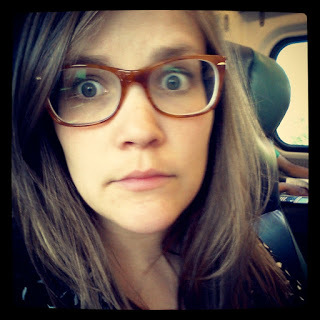
Meridith Friedman
Hometown: Honolulu, Hawaii (by way of Madison, Wisconsin)
Current Town: The East Side of Manhattan
Q: Tell me about your play going up at Curious Theater.
A: The Luckiest People is the first play in a trilogy that follows the Hoffman family over the course of about twelve years. The play was commissioned by Curious Theatre Company, with funding from my theatre fairy godmother, the amazing National New Play Network.
The trilogy deals with those middle years of life when obligations to kids, parents, and spouses are competing against each other for your time and attention and sanity. The Luckiest People begins after the death of the family’s matriarch. Her middle-aged son Richard (the protagonist of the trilogy) is blindsided when his elderly father Oscar demands to leave his assisted living facility. With his sister Laura living in Shanghai, and Richard soon to become a first time father with his partner David, he is less than thrilled at the prospect of housing his–to put it mildly–difficult father. Accusations begin to fly and defenses are drawn, spiraling father and son, brother and sister, and spouses into a heated game of finger pointing with unintended consequences.
Q: What else are you working on now?
A: I am writing the book for a new musical about art theft, an original pilot about the Supreme Court, and the third play of my trilogy (see above).
Q: Tell me, if you will, a story from your childhood that explains who you are as a writer or as a person.
A: I memorized Marisa Tomei’s monologue about deer hunting from the movie My Cousin Vinny at a pretty young age. Like long before it was probably appropriate for me to have seen that (fantastic) movie. And I would recite it for my parent’s friends at dinner parties sometimes. You know like how some parents will ask their kids to play the violin for their friends, or show off their art work? Like that. And their friends would get a hoot out of watching this third-grader say: “Would you give a fuck what kind of pants the son-of-a-bitch who shot you was wearing?”
Q: What kind of theater excites you?
A: I like explosive theatre. Theatre that makes me squirm in my seat. Plays that simmer and boil until that inevitable moment when they explode. When someone says or does something they can’t take back. And they have to deal with the aftermath. The consequences. I think we spend so much of our lives (or at least I do) carefully avoiding that moment–maybe that is why I find it simultaneously terrifying and exhilarating when I watch it play out on stage.
Q: What advice do you have for playwrights just starting out?
A: Figure out, early on, your definition of success. And try not to make that definition contingent on some external milestone that you have no control over.
I remember very clearly the moment I defined success for myself. I was sitting around a table with a group of really lovely, committed artists, and we’re working on a play I wrote, and everyone is breathing life and truth and heart into this blueprint I created, and it is becoming something so much richer and stronger than what I had envisioned, and it suddenly occurred to me: if I can keep hanging out in spaces like this, with artists like these, I’ll be successful. And fulfilled.
Q: Plugs, please:
A: The NNPN Rolling World Premiere of The Luckiest People at Curious Theatre company in Denver, playing May 4th – June 17th.
Demos from a musical I am currently writing with composer/lyricist Madeline Myers and director Emily Maltby about art theft.
Demos from a musical I recently completed with composer/lyricist Ryan Langer, about a couple that embarks on an open marriage after thirty years together.
---------------------------------------------------------------------------------------------------------
Enter Your Email To Have New Blog Posts Sent To You
-----------------------------------------------------------------------------------------------------------
Support The Blog

-----------------------------------------------------------------------------------------------------------
Mailing list to be invited to Adam's events
Email:
------------------------------------------------------------------------------------------------------------
Adam's Patreon
Adam's New Play Exchange Profile (Plays to Read)
Books by Adam (Amazon)







Published on April 29, 2017 08:00
April 28, 2017
I Interview Playwrights Part 929: Tyler Dwiggins
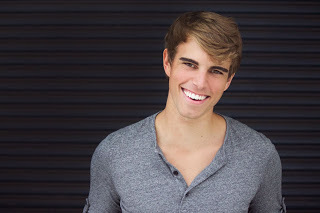
Tyler Dwiggins
Hometown: Middletown, Indiana.
Current Town: New York, NY.
Q: Tell me about Orange Is the New Glass.
A: Orange Is the New Glass is a fractured fairy tale that takes place in a kingdom where everybody is obsessed with social media, reality television, and chasing their fifteen minutes of fame. Think of Into the Woods through the lens of The Bachelor and Perez Hilton. The play centers on Cinderella, who bails on the less-than-charming Prince, gets locked in prison with her unlikely girl squad, and creates a political revolution.
Orange came out of my desire to give high school (and middle school) actresses a chance to play someone other than a weak damsel or an evil queen. Cinderella, Goldie Locks, Mother Goose, the Witch, and Rapunzel kick some ass, create cultural change, and support one another. They each have goals and ambitions.
Additionally, the play is about looking up from your cell phone every so often and staying politically informed. Although the play has a very silly, meta sense of humor, I hope the Orange kingdom is an empowering world for young artists to inhabit.
Q: What else are you working on now?
A: I’m working on a lot right now! I just finished performing in a workshop of my new play, The Binding, which I call my “gay Pixar play.” It’s about a religious, gay teenage boy whose childhood imaginary friend returns on his sixteenth birthday. It’s my favorite play I have written, and I am really looking forward to developing it further. I’m also cheating on Playwriting with (very rough drafts of) two television pilots and a Young Adult manuscript about a teenage pop star.
Q: Tell me, if you will, a story from your childhood that explains who you are as a writer or as a person.
A: Like most children of the 90s, I spent a lot of time playing with action figures of the Mighty Morphin’ Power Rangers. Unlike other millennials, my Power Ranger action figures spent very little time fighting crime or going on adventures in outer space. Conversely, my Power Rangers spent a lot of time sitting on spools of thread, gossiping about each other, and going on dates. They also had a LOT of affairs with one another. They were like a heterosexual, crime-fighting production of The Boys in the Band.
So when you read my plays and notice ensemble casts, pop culture references, and a responsible amount of silliness, you can thank the daydreaming of a gay preschooler and his company of plastic actors.
Q: If you could change one thing about theater, what would it be?
A: I wish it was more accessible to young people. In New York there are so many amazing ways for young people to get discount tickets. But that doesn’t really help if plays are still mostly aimed at middle-aged, straight, white people. The vitality of New York theatre is somewhat hampered by how myopic the perspective can be. I think this is getting better, and it’s certainly the topic of conversation, but there is a long way to go.
Also I would like to sit in more comfortable chairs when I see plays, but that’s the impossible dream.
Q: Who are or were your theatrical heroes?
A: I am inspired by anybody who can write a play that engages my heart and my brain at the same time. There are too many plays and musicals that settle for one or the other, and I just don’t think that’s really enough (most of the time). I’m inspired by Stephen Karam, Diana Son, Dominique Morisseau, Tony Kushner, Joshua Harmon, Samuel D. Hunter, Jordan Harrison, Suzan Lori Parks, Tennessee Williams, Kander and Ebb, Lynn Nottage, Stephen Sondheim, and of course, my pen pal: Philip Dawkins.
(And also, RuPaul. I think it's fair to say RuPaul is theatrical and heroic.)
Q: What kind of theater excites you?
A: I’m excited by theater that is generous to the audience. My golden rule is: don’t write a play you wouldn’t want to sit through. If I’m reading a draft of my work that isn’t exciting to me or feels a bit standard-issue, I try to take it in an unexpected direction. This can mean some visual flight of fancy, it can mean further exploration of a character, it can mean an unexpected plot twist. There's no reason that a play can't be smart and fun to watch.
I'm also very excited by plays that center on characters that would be relegated to the sidekick role in most stories.
Q: What advice do you have for playwrights just starting out?
A: I’m 26, so it feels a little presumptuous for me to go around giving much advice to people. Instead I will offer the advice I have to give myself daily: nobody is paying as much attention to you as you’re paying to yourself. Don’t be afraid to fall down, get messy, and write something that intimidates you a little. In my (limited) experience, that’s where artistic evolution tends to start: when you think to yourself, “Can this even work?”
Q: Plugs, please:
A: My plays for young actors, Orange Is the New Glass and subText, are available here:
https://www.playscripts.com/playwrights/bios/1640
Drama Book Shop is throwing a release party for Orange, and you can find out about that here:
http://www.dramabookshop.com/event/tyler-dwiggins-orange-new-glass-signing
And my Twitter is here:
https://twitter.com/t_dwiggs?lang=en
---------------------------------------------------------------------------------------------------------
Enter Your Email To Have New Blog Posts Sent To You
-----------------------------------------------------------------------------------------------------------
Support The Blog

-----------------------------------------------------------------------------------------------------------
Mailing list to be invited to Adam's events
Email:
------------------------------------------------------------------------------------------------------------
Adam's Patreon
Adam's New Play Exchange Profile (Plays to Read)
Books by Adam (Amazon)







Published on April 28, 2017 08:00
April 27, 2017
I Interview Playwrights Part 928: Emilio Rodriguez
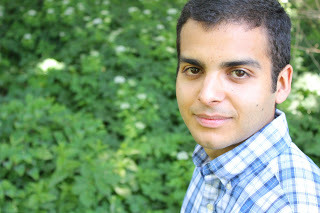
Emilio Rodriguez
Hometown: Riverside, CA is where I lived the longest, but I moved a lot growing up so really nowhere.
Current Town: Detroit, MI
Q: What are you working on now?
A: I'm currently working on a play inspired by Frida's time in Detroit. I'm not exactly sure how it will turn out yet, but the research has been fascinating and has helped me learn a lot more about where I'm living now. I'm also excited about the possibility of presenting it in Detroit because a lot of people, myself included, haven't really learned about the history of Latinos in Detroit, or even America for that matter. I feel like Latino history in American textbooks starts and ends with Cesar Chavez. I'm excited about going deeper with my own knowledge and seeing how that manifests into a play.
Q: Tell me, if you will, a story from your childhood that explains who you are as a writer or as a person.
A: I think my earliest creative memory was doing one-kid adaptations of the Wizard of Oz in my parents' living room using a funnel, a broom, and a pair of my mama's high heels. I think it's interesting that the idea of "home" is somehow in all of my works so far. It probably is because of the constant moving I did as a child, but maybe it has to do with my early love of the Wizard of Oz.
Q: If you could change one thing about theater, what would it be?
A: I would want people to be as excited about new plays as they are about new music and new movies. I say "people" because that includes audiences, artistic directors, actors, designers, directors, and even people who don't know they like theatre yet.
Q: Who are or were your theatrical heroes?
A: I probably never would've transitioned into theatre if it wasn't for Ntozake Shange, Octavio Solis, John Leguizamo and Culture Clash. Currently, I love the way Daniel Beaty weaves poetry into his work. I admire Katori Hall's creativity and ability to play in structure. I also really dig Matthew Paul Olmos' ability to capture the voices of So Cal Latinos which I love seeing on stage.
Q: What kind of theater excites you?
A: I am excited about anything that is unique. If I feel like I can see it anywhere, I give a side-eye to the producing theatre company. When I walk away feeling emotionally disrupted because I've seen something so original that I'm still trying to understand it, I get really excited. I really appreciate when a theatre takes a risk to do something no one else is doing. I love seeing something and walking away saying, "That character felt like a real person, but not like anyone I know."
Q: What advice do you have for playwrights just starting out?
A: I feel like I'm just starting out myself, but it's been really helpful for me to do readings with actors who get my voice and rhythm. If actors who understand my flow get a line wrong, I know it's something I messed up on. I know that means I have more work to do. I also find that building that ensemble of actors helps fight writers block, because I ask myself "Who do I wanna work with?" and "What would be the perfect role for them?"
Q: Plugs, please:
A: My play Swimming While Drowning will have an encore at Milagro Theatre June 9th and June 10th for the TCG conference. www.milargo.org has all the details.
---------------------------------------------------------------------------------------------------------
Enter Your Email To Have New Blog Posts Sent To You
-----------------------------------------------------------------------------------------------------------
Support The Blog

-----------------------------------------------------------------------------------------------------------
Mailing list to be invited to Adam's events
Email:
------------------------------------------------------------------------------------------------------------
Adam's Patreon
Adam's New Play Exchange Profile (Plays to Read)
Books by Adam (Amazon)







Published on April 27, 2017 07:36
April 25, 2017
I Interview Playwrights Part 927: Murray Mednick
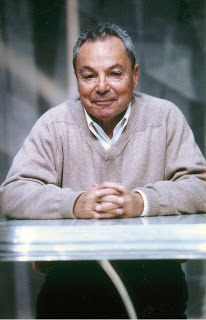
Murray Mednick
Hometown: Brooklyn NY, and I grew up part time in the Catskills
Current Town: Valley Village, CA
Q: Tell me about The Gary Plays.
A: THE GARY PLAYS are a series of plays I wrote about experiences I had in living my life in Los Angeles. They are mostly based on real events. I was also experimenting with theatrical form, including the modern use of the "chorus” and other technical issues, such as entrances and exits and transitions. Each play is a different theatrical and writing experiment, as well as a recounting of Gary’s events as he mourns for his dead son, Danny, shot and killed by accident in Griffith Park. I wanted to be as lyrical as I naturally am as a playwright and include as much as I could of my own author’s voice, directly to the audience. Begun in the ’90s, it seems to uncannily predict events, political and otherwise, in the present.
Q: What else are you working on now?
A: I am re-writing an older play of mine as a novel. TRUE CRIME STORY. Very challenging. Just finished three new plays: MAYAKOVSKY AND STALIN, SAYER, and THE WATCHERS.
Q: If you could change one thing about theater, what would it be?
A: Two things: the primacy of text, and the training of actors in the understanding of that premise. Naturally, we also need an audience, and an understanding of theatre as a medium quite different than movies and television or anything else.
Q: Who are or were your theatrical heroes?
A: My heroes were the Absurdists: Genet, Beckett, O’Neill. Ralph Cook of Theater Genesis in New York was responsible for my learning the art form and encouraging me to stay with it.
Q: What kind of theater excites you?
A: Precise, minimal, textual.
Q: What advice do you have for playwrights just starting out?
A: My advice is to hook up with a theater and do plays. Best way to learn. An example of the ideal learning experience for young writers was THE PADUA HILLS PLAYWRIGHTS FESTIVAL that I founded here, which put on new plays, held classes, and could talk intelligently about the art form.
Q: Plugs, please:
A: Open Fist’s production of THE GARY PLAYS is going to be an epic, mammoth event! Come see it over the course of three evenings — or view all six plays on a single Sunday starting at noon. May 4 thru June 4 only! www.openfist.org.
---------------------------------------------------------------------------------------------------------
Enter Your Email To Have New Blog Posts Sent To You
-----------------------------------------------------------------------------------------------------------
Support The Blog

-----------------------------------------------------------------------------------------------------------
Mailing list to be invited to Adam's events
Email:
------------------------------------------------------------------------------------------------------------
Adam's Patreon
Adam's New Play Exchange Profile (Plays to Read)
Books by Adam (Amazon)







Published on April 25, 2017 08:00
April 24, 2017
I Interview Playwrights Part 926: Carolyn Balducci
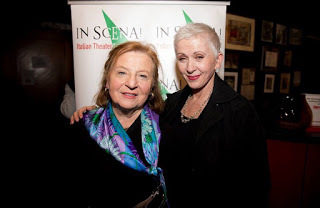
Carolyn Balducci (left) with actress Karin de la Penha (right). Photo by Carlotta Brentan
Carolyn Balducci
Hometown: Pelham, NY (Westchester)
Current Town: Montauk, NY
Q: Tell me about Giovanni The Fearless:
A: Synopsis - Giovanni the Fearless is a family-friendly commedia dell'arte folk opera about actors, young lovers ... and a couple of ghosts. When Giovanni encounters the Bombasto Family commedia troupe, he becomes enchanted with the star of the show, the beautiful Colombina. Tricked by Colombina's overprotective father and siblings into believing that a treasure lies hidden in a haunted castle, Giovanni deals with a fake ghost (the Bombasto's giant puppet) then confronts an actual ghost. In the end, he discovers that the real treasure is his love for Colombina. Projections, clowning, tumbling, puppetry, special effects, and onstage musicians enhance this romantic musical comedy.
Background - The original tale, Giovannin' Senzapaura, is widely dispersed in Italy and I knew about it for many years. The story involves actions that I knew would be more fun to see and hear than to read about. So it began as a play for actors and puppets.
In doing scholarly research, I found that the plot, which involves Giovanni's encounter with a ghost and re-unification of its dismembered body parts, derives from the mythology of Isis and Osiris. The ISIS cult was once a pervasive religious persuasion in Italy especially Magna Greca, eg the liquor Strega named after the wican underground which is what the oppressed Isis cult became. My research and life experience also lead to an understanding of the roots of the Italian commedia dell'arte tradition. In writing the early drafts of Giovanni the Fearless, I realized that there were only three characters and all were male. Since Giovanni is a young man, it seemed logical that there would be a young woman in the story and in the commedia there is always a Pantalone who runs interference with his daughter's love interests. Giovanni is fearless, but in the course of the play, he finds out, as many of us do, that the most profound fear is that harm will befall a loved one. In a twist, when Giovanni thinks he's doomed, it is timid Colombina who rescues him.
The play is set in Italy in the early 20th century - decades when urbanization, natural disasters, mass immigration and inventions like the automobile, cinema and radio were reducing the popularity of commedia troupes. Giovanni (John) or Giovannino (Johnny) is a universal folk 'type' with brethren in all European popular cultures-- John, Ivan, Sean, Ian, Jack even Johnny Appleseed - are all wanderers. So whether or not our title character is heading to an Italian city or planning to sail to North or South America, he's an immigrant on the road to adventure.
Good theater always addresses universal experiences that are relevant to present day issues, At the same time, a play is a combination of fantasy and personal sensibilities and experiences. Beneath the surface, even though Giovanni the Fearless is meant to be entertaining and fun, to quote the lyrics in one of our songs, The Loving Tree, "…its roots go deep, deep down in the earth and under the Seven Seas."
Written in the 1990s, performed at the University of Michigan in 1997 - full cast, student-faculty production. Music was improvised by a young composer to suit the vocal strengths of the cast. (This show was awarded additional funding from Michigan Council for the Arts and UM's Year of the Arts.)
I met Mira J. Spektor, the composer of this show, in 2005 and she set my lyrics to music - 17 songs. In 2010 a cast of opera singers did a concert reading at the Dramatists' Guild. We were limited to one hour, so I adapted the script to include a narrator to convey the action and streamlined the dialogue. We did this version three more times - a directed reading in the Hamptons and at the Havoc Theatre in the Abingdon Theatre Complex in 2011; and a semi-staged directed reading at the Nimoy/Thalia Theatre at Symphony Space in 2012. Some of the songs have been sung in concerts. Last winter, I restored the full-length version which provided more clowning and sight gags, putting back a some of the minor characters and giving a stronger sense of the characters' motivations.
Both the composer and I feel that this work's combination of magical elements with theatrical artifice and improvisational comedy invokes the old-fashioned ideal of romantic love. Thus we believe it is best suited to the operatic form. We also feel that an opera that appeals to family audiences might provide kids with an entertaining introduction to classical opera.
Anyway, one more comment…
We are calling it a 'folk opera' ...but in current terminology it could be considered a cross-over -- au currant.
Q: What else are you working on now?
A: FIRESTONE- Maestro Pirandello as recalled by Miss Marta Abba. In the last ten years of Pirandello's life, Abba worked very closely with him. There were readings of the work-in-progress last year in New York. One had a few actors representing different people in the playwright's life; the second was a short version, a solo at Cherry Lane, (performed by Karin de la Penha, who was stupendous and brought down the house!) I would like to keep going with this.
Q: Tell me, if you will, a story from your childhood that explains who you are as a writer or as a person:
A: I went to public and private Catholic schools. I hung out with friends, swam competitively, thought I'd be an artist, was involved with some community theatre. I was always a good reader. Best times were summers reading stacks of library books at the beach. Once I found out that dramas didn't have a lot of tedious narration, I read a lot of plays.
Q: If you could change one thing about theater, what would it be?:
A: The cost of producing a play makes it extremely difficult for anyone with real talent to get their work staged. As a result there's absolute garbage on Broadway. The insane cost of theatre tickets puts it out of the range of middle class audiences.
Q: Who are or were your theatrical heroes?
A: Off hand, I really don't know...Shakespeare...Chekov...Pirandello...Albee...Sheridan ... Ludlam ..."Anonymous"
Q: What kind of theater excites you?
A: Intelligent comedies... (is that an oxymoron?)
Q: What advice do you have for playwrights just starting out?
A: Master the English Language! Study grammar! Read a lot of plays! Marry up!
Q: Plugs, please:
A: GIOVANNI THE FEARLESS, a commedia dell’arte folk opera. Music by Mira J. Spektor; book & lyrics by Carolyn Feleppa Balducci will be performed at the Theater for the New City, May 12-21.
My translation of Dovizi's La Calandra absolutely deserves production - the granddaddy of all screwball comedies - written in 1535. Adapting/producing a musical play by David Garrick is another on my to-do list.
---------------------------------------------------------------------------------------------------------
Enter Your Email To Have New Blog Posts Sent To You
-----------------------------------------------------------------------------------------------------------
Support The Blog

-----------------------------------------------------------------------------------------------------------
Mailing list to be invited to Adam's events
Email:
------------------------------------------------------------------------------------------------------------
Adam's Patreon
Adam's New Play Exchange Profile (Plays to Read)
Books by Adam (Amazon)







Published on April 24, 2017 00:16
April 23, 2017
I Interview Playwrights Part 925: Kristine Haruna Lee
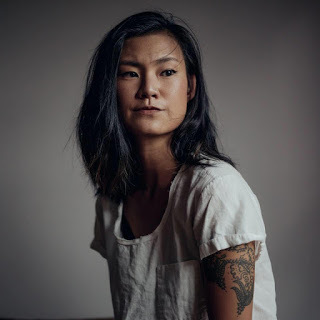
Kristine Haruna Lee
Hometown: Mercer Island, WA. But I was born in Hong Kong and grew up in Tokyo till I was 10.
Current Town: Brooklyn, NY.
Q: Tell me about Suicide Forest.
A: I was inspired to write Suicide Forest after reading Adrienne Kennedy's play Funnyhouse of a Negro. I was curious if I could also write a play that could journey into deeper, darker territory of racial identity as Kennedy's play does. it's such a mirror play. Circular. It's not afraid to reflect back the ugly truth. So it made sense to me to set my play in Aoikigahara, or Suicide Forest at the base of Mt. Fuji in Japan. It's a real forest where folks go to commit suicide. Suicide is historically an honorable way to exit in Japanese culture, or that's my understanding of it. I connect this to the principle of uniformity, and the sacrifice (of your life) being the ultimate gift you can make to your community when you can no longer be the same as everybody else, when you can no longer be homogenous in spirit.
I never fit in as a Japanese person in Japan... so maybe this is me taking space.
Growing up in Tokyo as a kid (and being raised by my Japanese mother), I think so many of my plays are aesthetically influenced by this in the imagery I try to conjure, in it's logic, and yet I've never actually tried to write a play about Japan or being Japanese, I guess because my language skills are so-so and all the other identity-baggage that comes with it. So this was my attempt: the juxtaposition of creating a narrative that is specifically Japanese in all its references and images, and yet written in the english language. Aya Ogawa, who's an amazing director, creator of her own work, and translator of Toshiki Okada's plays, is working with me on this and we'll be sharing a reading at Ars Nova on May 4th at 3pm, with a cast of Japanese/Japanese heritage performers who'll help us excavate this play.
Q: What else are you working on now?
A: My theater company harunalee has been in residence at Brooklyn Arts Exchange for the past two years, and we've been developing a new play titled Memory Retrograde. This was a cool project for me because the script developed with the company over the span of two year, which we've never done that before. We are showing all 3 parts of the play April 28+29 8pm at BAX.
A couple finds a strange 'remembering' object in the attic, and ponders over the possibility of having lived past lives together. The act of remembering conjures their younger selves, and they all mingle in simultaneity. Their ‘time travels’ take them to their past life in Venice 1515, an Egyptian Burial, the 1970's, Ancient Greece, and a virtual reality forest some time in the far future. As memories epically span generations and landscapes, this couple's recurring trauma is brought to light and replayed over and over again through all these layers of time and space as they figure out how to deal with a single tragedy that haunts their lives.
Q: If you could change one thing about theater, what would it be?
A: Less white-led theater institutions.
Q: Who are or were your theatrical heroes?
A: My theater hero right now is Sibyl Kempson. She possess the ability to create auteur performances/visions, and yet her practice is firmly rooted in playwriting. Her words are her instrument to invent fantastic visuals and I follow in that lineage. Sibyl has an incredible performance series going up at the Whitney called Ten Shouts to the Forgotten Heavens which performs every solstice and equinox till 2018. Every performance is different, a ritual, and a durational hymn or ode to the seasons... She is seriously a badass.
Q: What advice do you have for playwrights just starting out?
A: Hmm.. I think the biggest advice I needed when I started writing was don't listen to other people- especially the people you're told to look up to or aspire to. Everybody wants to change your play, everybody has something to say. But the play is not a commodity. You are not a commodity. It's living. Invent your own structures. The play is smarter than you, so trust it. Surround yourself in community with folks who understand your work, and can give you feedback that isn't detrimental to the kind of organism the play is, and the kind of ecosystem it needs to thrive in.
Q: Plugs, please:
A:
[image error]
harunalee and bax present
Memory Retrograde
April 28 + 29 @ 8pm
Brooklyn Arts Exchange
421 5th Ave. Studio D
A couple finds a strange 'remembering' object in the attic, and ponders over the possibility of having lived past lives together. The act of remembering conjures their younger selves, and they all mingle in simultaneity. Their ‘time travels’ take them to their past life in Venice 1515, an Egyptian Burial, the 1970's, Ancient Greece, and a virtual reality forest some time in the far future. As memories epically span generations and landscapes, this couple's recurring trauma is brought to light and replayed over and over again through all these layers of time and space as they figure out how to deal with a single tragedy that haunts their lives.
written and directed by Kristine Haruna Lee
associate directed by Lauren Swan-Potras
conceived with Andrew R. Butler
costume design by Karen Boyer
set design by Greg Laffey
sound design by Jen Goma
lighting design by Sarah Lurie
video design by Stivo Arnoczy
production managed by Teri-An Caryl
photos by Sasha Arutyunova
with:
Shiree Adkins
Jess Almasy
Andrew R. Butler
Josh Gelb
Madeline McCray
Keith McDermott
Imran Sheikh
xxx
Ars Nova invites you to
a Makers Lab reading of a new play
Suicide Forest
Written by
KRISTINE HARUNA LEE
of 2017 Makers Lab Resident Company
harunalee
Directed by AYA OGAWA
Thursday, May 4 @ 3PM
A despairing salaryman and a fed-up young school girl both decide to enter Japan's most notorious suicide spot, 'Aokigahara' or Suicide Forest, at the base of the national mountain. A nightmare play examining the sickness of a culturally uniform masculinity and the traditionally heroic performance of suicide.
This event is FREE, but RSVPs are a must!
Click HERE to reserve your tickets!
---------------------------------------------------------------------------------------------------------
Enter Your Email To Have New Blog Posts Sent To You
-----------------------------------------------------------------------------------------------------------
Support The Blog

-----------------------------------------------------------------------------------------------------------
Mailing list to be invited to Adam's events
Email:
------------------------------------------------------------------------------------------------------------
Adam's Patreon
Adam's New Play Exchange Profile (Plays to Read)
Books by Adam (Amazon)







Published on April 23, 2017 10:40
April 17, 2017
I Interview Playwrights Part 924: Thomas Gibbons
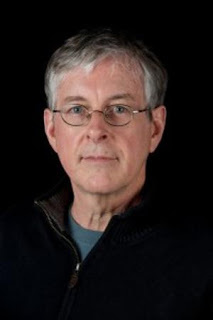
Thomas Gibbons
Hometown: Philadelphia, PA
Current Town: Devon, PA (not far from Philadelphia)
Q: Tell me about 'Uncanny Valley'
A: UNCANNY VALLEY draws on current research in artificial intelligence, robotics, and the possibility of “downloading” human consciousness as a means of extending the human lifespan, charting the relationship between Claire, a neuroscientist, and Julian, a nonbiological human. As Julian is “born” over the course of the play---first his head, then an arm, then both arms and his torso, and finally his legs---Claire educates him in techniques of being as human as possible: mirroring people’s speech, engaging in small talk, playing a musical instrument. Her goal is to overcome the “uncanny valley” effect by which people’s initial fascination with a lifelike artificial human inevitably transforms into revulsion. The play began in my dentist’s waiting room. Leafing through a magazine, I saw a photograph: a man in a chair facing a table, on top of which is placed a startlingly lifelike robotic head (Bina48, whom I “met” when the play had its premiere at Contemporary American Theater Festival in 2014). Arresting enough, but as I looked at the photo I found myself equally intrigued by the room surrounding them. Instead of a sterile laboratory, the two were in an incongruously old-fashioned parlor with carpet, a floor lamp, heavy drapes, and stenciled walls. Something about this photograph haunted me---maybe the disjunction between the turn-of-the-(last) century room, and the cultural stability it embodied, and the robotic head’s confident, self-possessed gaze.
Q: What else are you working on now?
A: I’ve just finished a new draft of a play called DARK DAMOCLOID, a kind of fantasia about the prospect of mass extinction (ours)---a subject that haunts all our minds whether we acknowledge it or not. I’ve also started work on another play in a more realistic vein, dealing with the conflict between science and religion.
Q: If you could change one thing about theater, what would it be?
A: If I were the All-Powerful King of Theater I would declare an immediate moratorium on dysfunctional-family plays that have no reference to the wider world. I find them, for the most part, formulaic, unsurprising, unimaginative, toothless, and boring. This would have the incidental effect of making literary managers’ jobs much easier, since about 90% of the plays in their to-read pile would disappear.
Q: Who are or were your theatrical heroes?
A: Early on I was very influenced by the British socialist playwrights of the 70s: Edward Bond, David Hare, David Edgar, Howard Brenton, and so on. Also Samuel Beckett and Caryl Churchill.
Q: What kind of theater excites you?
A: I like plays I haven’t seen before, plays that grab me by the collar, throw me against the wall, turn me upside down, and shake the preconceptions and unexamined assumptions out of my head.
Q: What advice do you have for playwrights just starting out?
A: Resist the temptation to write autobiographical plays about your dysfunctional family. Imagine more interesting worlds and give them to us.
Q: Plugs, please:
A: UNCANNY VALLEY will have its Los Angeles premiere starting April 21 at International City Theatre, under the direction of artistic director caryn desai. Productions are also under way at Barter Theatre in Abingdon, VA, and Open Stage of Harrisburg.
---------------------------------------------------------------------------------------------------------
Enter Your Email To Have New Blog Posts Sent To You
-----------------------------------------------------------------------------------------------------------
Support The Blog

-----------------------------------------------------------------------------------------------------------
Mailing list to be invited to Adam's events
Email:
------------------------------------------------------------------------------------------------------------
Adam's Patreon
Adam's New Play Exchange Profile (Plays to Read)
Books by Adam (Amazon)







Published on April 17, 2017 05:29

